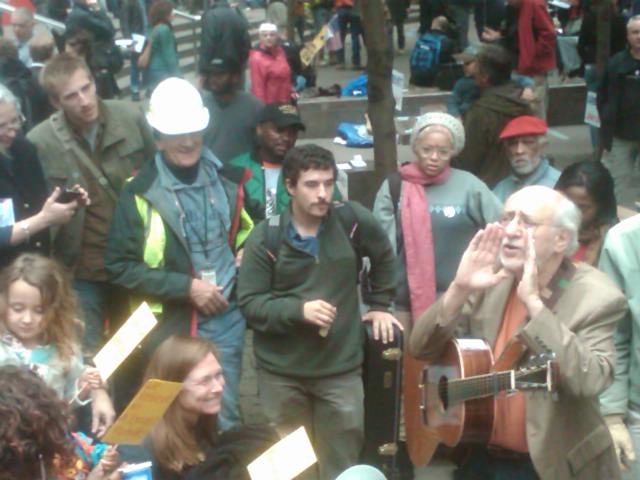"If you could press a button and get anything you want done, what would you want to achieve?" I asked the earnest young man at the Occupy Wall Street campaign in New York. I expected to hear him say, "Send the guilty bankers to jail," or, "Create a million jobs, now," or even, "Take half of the wealth from the 1% and give it to the rest of us." The answer spoke volumes about the how far this protest movement still has to go before it gets traction. "We want to change the economic system of the world," he told me.
I had made my way down to Zuccotti Park, a block or so from Wall Street in lower Manhattan, site of the protest gathering now in its fifth week. After all, I'd seen the mother of all protests in my time, the anti-Vietnam war movement of the 60s. That movement had also begun as small rallies on college campuses, grown, and against all odds, destroyed establishment support for that war and forced its termination.
I was the young man's age during the anti-Vietnam protests. Had I asked the same question of one of the demonstrators then, the answer would have been short and to the point: "Get out of Vietnam, now!" I had expected a similar laser-like focus at the Occupy Wall Street campaign and was disappointed when I did not find it.
This movement appears different in another way from the Vietnam protests. It does not have a clearly defined leadership. In New York the group of around a thousand seemed to have many self directed groups within it. People with communications experience had set up chairs to create a makeshift press area; those with entertainment expertise had sing-along groups; organizational types had set up a bulletin board with scheduling and task information; others that felt comfortable speaking walked around to stop visitors like me and start a conversation with a question like the one my interlocutor had asked, "So what do you think of our movement, sir?" Yet others ran a makeshift kitchen to feed the 24 hour/day campaign.
All of a sudden I heard the haunting words of that Vietnam era classic, Puff The Magic Dragon. I walked over to the singer and did a double take.

As I watched, a burly construction worker with his hard hat sauntered over. I expected a confrontation, but the man said, "Paul, I'm here to sing with you."
"Brother, can we sing, Blowing in the Wind?" Paul asked to roars of approval. Paul obliged and the burly construction worker lustily sang along. He was in his fifties, but was clearly in tune with the crowd's sentiments.
I talked to the construction worker (he is in the picture above) a bit later and asked him where he thought this movement was headed, "I'm not sure," he told me. "Everyone here is dedicated, but can they maintain their enthusiasm? Can they achieve anything without goals and organization? "My heart is with them, but I'm not sure," he said.
Well, both the construction worker and I clearly misjudged the mood of the moment and the pent-up feelings of frustration and alienation the Occupy Wall Street movement has unleashed. The day after my visit, 3,000 construction and trade union leaders joined the Wall Street protesters to march down Broadway in a massive show of support. It made the front page of the New York Times. Some $5,000 is now being donated in cash, daily, at the protest park every day. On Columbus Day, a New York City teacher took her students to the protest and staged a teach-in. More than 150 cities now have their own versions of Occupy Wall Street.
Perhaps that construction worker and I are mistaken, and there is more to this movement than meets the eye. It is simply too soon to know. But something is clearly blowing in the wind.
?
?
?
Follow Sarwar Kashmeri on Twitter: www.twitter.com/digvic
Source: http://www.huffingtonpost.com/sarwar-kashmeri/occupy-wall-street_b_1000075.html
hilary duff pregnant psat psat brenda song mountain west mountain west rickross
No comments:
Post a Comment
Note: Only a member of this blog may post a comment.